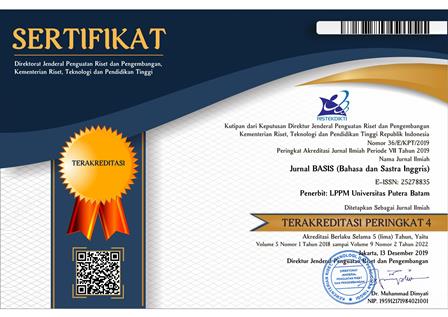NON-ENGLISH STUDENTS ‘ATTITUDES TOWARDS LEARNING SPEAKING
DOI:
https://doi.org/10.33884/basisupb.v8i2.3709Kata Kunci:
attitudes, students, speaking, EnglishAbstrak
The issue addressed in this research was attitudes of students taking non-English major towards English learning, especially speaking. The study involved 39 students from a compulsory English class at STKIP PGRI Banjarmasin. The data were collected through questionnaires and interviews. The questionnaires were arranged to reveal students’ attitudes in three components namely affective, behavioral, and cognitive components. The interviews were conducted to clarify and strengthen the findings from the questionnaires. The results of study showed gaps between affective - cognitive components and behavioral one. Most participated students had positive attitudes towards English learning as seen from the affective and behavioral components; however, their behavioral attitudes showed otherwise. Students’ behavioral attitudes were still negative towards learning speaking. These positives attitudes were caused by several reasons including their career aspirations and awareness of the importance of English. Furthermore, the negative attitudes were caused by their study priorities and other personal reasons. In conclusion, what they felt and believed about English did not match their efforts to study the language.
Referensi
Creswell, J. W. (2013). Qualitative Inquiry & Research Design: Choosing among Five Approaches (3rd ed.). Thousand Oaks, CA: SAGE.
Eshghinejad, S. 2016. EFL students’ attitudes toward learning English language: The case study of Kashan University students, 1-13. Retrieved from https://eric.ed.gov/?id=EJ1138277
Hogg, M., & Vaughan, G. (2005). Social Psychology (4th edition). London: Prentice-Hall.
Hosseini,S., & Pourmandnia, D. (2013). Language Learners’ Attitude and Belief: Brief Review of the Related Review Literature and Frameworks. International Journal on New Trends in Education and Their Implications, 4 (4), 63-74.
Isti, M. & Istikharoh, L. (2019). EFL Students’ Attitude toward Learning English. JSSH (Jurnal Sains Sosial dan Humaniora), 3 (2), 95-105.
Iswahyuni & Shefryanto, F.J. (2018). Computer Science Students’ Attitudes towards English Language Learning. EDUCAFL: Journal on Education of English as Foreign Language, 1 (2), 1-4.
Karahan, F. 2007. Language Attitudes of Turkish Students towards the English Language and its Use in Turkish Context. Journal of Arts and Sciences Say, 73-87.
Mensah, J., Okyere, M., & Kuranchie, A. (2013). Students Attitude towards Mathematics and Performances: Does the Teacher Attitude Matter?. Journal of education and practice, 3, 132-139.
Ostrom, T. M. (1969). The Relationship between the Affective, Behavioral, and Cognitive Components of Attitude. Journal of Experimental Social Psychology, 5(1), 12–30.
Stark, T. H., Flache, A., & Veenstra, R. (2013). Generalization of Positive and Negative Attitudes toward Individuals to Outgroup Attitudes. Personality and Social Psychology Bulletin, 39 (5), 608-622.
Zulfikar, T., Dahliana S., & Sari, R. A. (2019). An Exploration of English Students’ Attitude towards English Learning. English Language Teaching Educational Journal, 2 (1), 1-12.
##submission.downloads##
Diterbitkan
Terbitan
Bagian
Lisensi

















